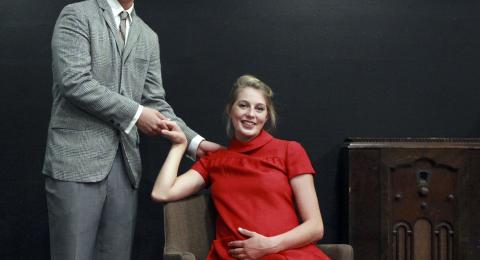SUNY Oswego dramaturgy crew helps keep 'Clybourne Park' true to two eras
Office of Communications and Marketing
Published
It's 1959: A snub involving iced tea here, a remark about a car there and a deaf character in the script -- all of those instances and many more highlight the value of dramaturgs -- research and development consultants for plays -- in staging the upcoming "Clybourne Park" from the SUNY Oswego theatre department.
The comedy-drama will open at 7:30 p.m. Thursday, Oct. 19, in the modernized Waterman Theatre of Tyler Hall. The Bruce Norris play will run Oct. 20 and 21 and, again from Thursday to Saturday, Oct. 26 to 28. The two Saturday performances, Oct. 21 and 28, are matinees at 2 p.m.; all others curtain at 7:30 p.m. Henry Shikongo of the theatre department directs the student cast.
Critical to Bruce Norris' play satirizing attitudes about race and gentrification, a team of students joins their professor, Dr. Toby Malone, as dramaturgy crew to ensure a play set in the late '50s and today rings true to those eras for all audience members.
In addition, "Clybourne Park" and its predecessor, "A Raisin in the Sun" will be the subject of a panel discussion from 11:30 a.m. to 12:30 p.m. Oct. 28 in Hewitt ballroom, featuring Malone, Syracuse Stage Artistic Director Bob Huff, SUNY Oswego Associate Provost Patricia Clark of the English and creative writing faculty and Cynthia Henderson, a theatre professor from Ithaca College who works in theatre for social justice. Some of the discussion topics will focus on issues of redlining, family hierarchy, black masculinity, race and ethnicity in the 1950s and now, as well as racially restrictive covenants.
In 1959 -- Act I of "Clybourne Park" -- a white couple has inadvertently sold their house to the neighborhood's first black family, after having decided to move to the suburbs following a family tragedy. Neighbors vehemently urge the couple to back out of the deal.
Fifty years later, in Act II, a white couple buys the property in what is now a predominantly black neighborhood, raising fears of white gentrification. Another community showdown pitting race against real estate takes place. The home -- the same one made famous in Lorraine Hansberry's "A Raisin in the Sun" -- is the battleground once again.
'A blessing'
Student dramaturgs Caitlyn Weinell, Henry Liebentritt, Khari Constantine, Sydney Lattenhauer, Emmy Lang, Molly Horth and Leah Iannone have the task of keeping the production as real as possible, historically and sociologically speaking.
"The dramaturgs are definitely a blessing," said stage manager Cadi Hannold, a senior majoring in both theatre and creative writing. "So much is hinted at in the play, so if the actors don't understand a line or a reference, they may misinterpret it and the audience may misunderstand."
The iced tea snub? "We'd been through the script a hundred of times," said Weinell, a senior theatre major. "One detail we never looked at before: At one point in the first act, everyone is offered iced tea -- except the maid and the maid's husband." Both are African American.
The car comment? In the printed script, it's ambiguous -- actors were unsure whether the remark was a slight or a compliment. The dramaturgs did their research about the era-specific vehicle and made the call, Weinell said.
The deaf character? Shikongo and others involved with the play think it's critical that an Act I character, Betsy, played by Olivia Wilmot, comes off as both multidimensional and believable.
Hannold, who as stage manager coordinates the production and keeps it running smoothly and on time, said that along with the work of Wilmot and the team of dramaturgs, Tommy Reynolds, a member of Oswego's deaf community, has consulted with the entire cast and crew, assisted by translator Isaiah Tyler. The college anticipates having two specially trained translators working at the finale on Oct. 28.
"A lot of people did a lot of research on what were the norms (in the '50s) for how deaf people were treated," said Liebentritt, a senior majoring in human resource management and minoring in theatre. "Once you delve into the research, you find out how important dramaturgy is to the production."
Weinell agreed. "I didn't even know what it (dramaturgy) was until Dr. Malone's class. It's been a real blast. Working with all of the actors and being able to answer their questions is a lot of work, but a lot of fun."
Other crew
Other key student members of the crew include assistant director Wyatt Gilbert, assistant stage manager Nicole Caroselli, assistant lighting designer Stephen Quigley, master carpenter and deck chief Evan Carrobis, assistant master electrician Nova Grayson Casillo, light board operator Stephen Quigley and wardrobe head Valerie Blaha.
Besides Shikongo and Malone, faculty and staff crew members include set, lighting, projections designer and props master Ola Kraszpulska; sound designer TJ Bandla; costume and makeup designer Kitty Macey; technical director Sean Culligan; master electrician Greg Brewster; and costume shop supervisor Judy McCabe.
Tickets for "Clybourne Park" are available for $15 at any SUNY Oswego box office, online at tickets.oswego.edu or by calling 315-312-2141. Parking is included in the price of a ticket, and is available in the employee lot in front of Culkin Hall and the employee and commuter lots behind Hart and Funnelle residence halls.
People with disabilities who need assistance to attend should call 315-312-2141 in advance of a performance.
A grant from the SUNY Office of Diversity, Equity and Inclusion supports the Oct. 28 panel discussion prior to the "Clybourne Park" finale, as part of SUNY Oswego's "Many Voices: One Oswego: Diversity and Inclusion Through the Arts" series of programs.
For more information on the performing and fine arts at SUNY Oswego, visit oswego.edu/arts.



